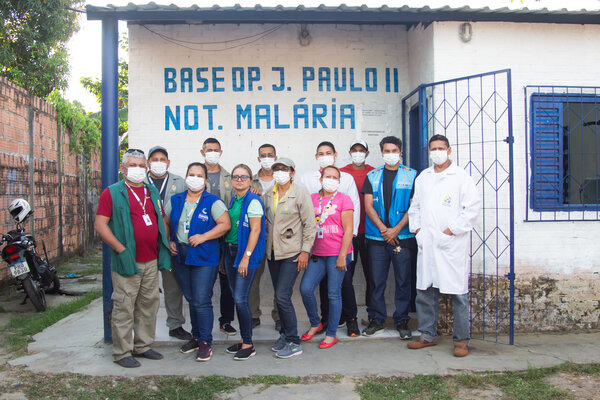New treatment for relapsing malaria, tafenoquine rolled out in Brazil starting with the Yanomami indigenous people
Decision comes following an extensive review of evidence of the feasibility, safety and efficacy of the new treatment protocol
22 March 2024, the Yanomami Indigenous people, in Roraima, became the first in Brazil to receive tafenoquine and point-of-care glucose-6-phosphate dehydrogenase (G6PD) testing for Plasmodium vivax (P. vivax ) malaria, following the decision of the government to adopt the use of these new health technology innovations. Elodie Jambert, Senior Director at Medicines for Malaria Venture (MMV) congratulated the government of Brazil saying, 'The Brazilian government has prioritized the needs of the most vulnerable in extending access to this important new medicine first to the Yanomami. We are excited to see tafenoquine being rolled out for the first time outside of a study setting, and so swiftly after evidence has been published showing its public health and patient benefit.’
Tafenoquine is a single-dose treatment used in combination with chloroquine for the radical cure of P. vivax malaria developed by MMV and GSK. The drug was incorporated into the Brazilian Unified Health System (SUS) in June last year, after a review of evidence on the safety and efficacy; real-world feasibility, cost-effectiveness and budget impact of introduction by CONITEC, the Brazilian Commission of Technology Incorporation in the Public Health System. Brazil is the first malaria-endemic country in the world to adopt this new treatment.
A shipment with 8,000 tafenoquine treatments has been dispatched to the Yanomami Special Indigenous Health District (DSEI), enough to meet the needs of the population for the next 6 months. This week, 105 local health agents started a training course covering the administration of tafenoquine appropriately guided by quantitative, point-of-care, G6PD testing. The training was provided to doctors, nurses and nurse technicians in Boa Vista and at the Surucucu base center. The Ministry of Health team is also working on training professionals to treat severe malaria in pregnant women and children.
The government decision stands as a pivotal response to the ongoing and urgent public health emergency within the territory, where malaria remains endemic. In 2023, 30,972 cases of malaria were reported in the Yanomami DSEI, seventy percent of which were P. vivax. Tackling the disease has been treated as a priority by the current administration, which has worked with other ministries, government bodies and international organizations to deliver the new test and treatment.
Recently, the results of the Tafenoquine Roll-out Study (TRuST) in the Brazilian Amazon were published in the Lancet Global Health, providing encouraging real-world evidence on the operational feasibility of introducing single-dose tafenoquine, in combination with chloroquine, alongside G6PD testing for P. vivax radical cure. The study was co-sponsored by the Brazilian Ministry of Health and MMV, and conducted in the municipalities of Manaus, Amazonas (AM), and Porto Velho, Rondônia (RO). Following this, on 4 March 2024, the Lancet Infectious Diseases also published operational effectiveness data from the TRuST study, confirming the public health and patient benefits of using quantitative G6PD testing and tafenoquine in P. vivax malaria case management in Brazil.
Support for optimizing P. vivax radical cure was provided by the Partnership for Vivax Elimination (PAVE), led by PATH and MMV and supported by GHS in Brazil. PAVE works with National Malaria Programmes and researchers to generate and make available high-quality evidence to inform malaria case management in support of P. vivax elimination worldwide.
